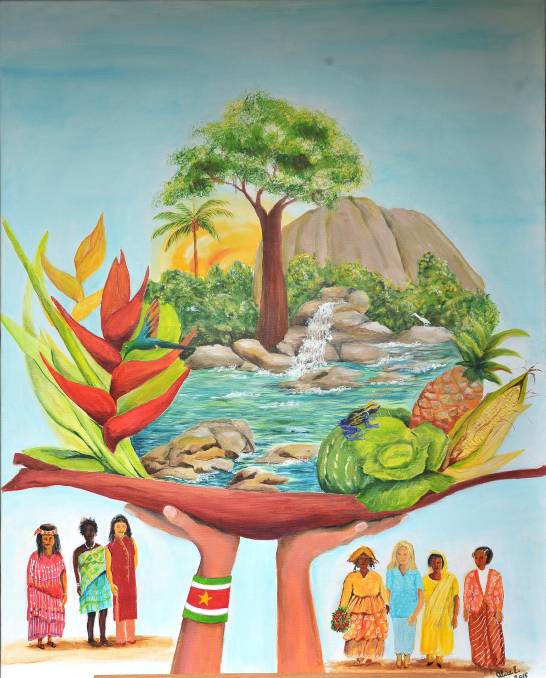We need varying strategies for convincing Christians to invest in environmental conservation. Some read Genesis 1 with an extended interpretation of what “dominion” should really mean. Others appeal to personal interest — of favorite places or animals endangered — then cover it in faith-based language. I am most moved by the appeals to protect Jesus’ “least of these,” since the world’s poor and most marginalized already are and will be most affected by the scourge of climate change.
But what about this approach? Christians are called to be conservationists, because we know the work intimately. It is our same gospel work. Is that not a calling: When a dire need of God’s beloved creation meets our practiced skills, abilities, and determined hope?
When I stepped outside my normal head space for a workshop run by National Geographic Fellow Dr. Rae Wynn-Grant on inclusion in conservation, the similarities between our fields struck me with force. Those who are called to share the gospel of Jesus Christ with the world use the same skills, cultivated determination, and relational strategies as conservation field workers, and vice versa. Our efforts are based in the same indefatigable hope and trust in resurrection.
Who makes conservation science happen? There are the PhD’s, certainly. But Dr. Wynn-Grant directed our gaze toward the people who are invisible when we sketch a scientist’s “professional network” — the local drivers, women park rangers, girls who learn to educate their own communities about how to live beside wild animals without fearing and killing them, or those who care for children so that ecologists can spend extended periods of time in field research. Scientific breakthroughs and gains in conservation do not happen without these unseen contributors.
The early adopters in conservation are likely to be those who know their place in power structures are precarious. Every family of ranchers that signed on to restore habitat and migration pathways for large predators during the American Prairie Reserve‘s first phase (Dr. Wynn-Grant’s current focus), were families of Native American descent. Does everyone remember who were the first to experience and share the resurrection news, because they went to the tomb early on the third day to tend Jesus’ body? The women, of course. Or who tipped off Naaman the Syrian commander that there was healing to be found from the Lord’s prophet Elisha? It was a Jewish servant girl, trafficked in battle in 2 Kings 5. The Word of God would never have spread without these vulnerable messengers. But first, we must see and value everybody who contributes.
Blessed are the marginalized — women, black, indigenous, people of color, those in economic distress — who give all they have to save those more vulnerable than themselves. The work of conservation (like spreading the gospel) relies heavily on talking to people in ways they can actually hear, so that they can weave it into their own self-understanding. The message needs to not only matter in general, but specifically to me, for me to change any behaviors as a result of any claims presented.
Conservationists and Christians are about relational work, planting trust, then seeds of hope. Although science or theology may be bodies of knowledge one can study and learn to articulate, the field work for both is building trust, which we do through the painstaking investment of our own time and effort on behalf of the earth and/or God.
Knowing about animals or plants or the health of the soil does not change how we are living, but being in healing relationship with them — chasing resurrection — could.
Dr. Wynn-Grant and her team with the American Prairie Reserve spend a lot of time at kitchen tables. So do Christians who actually intend to share our faith. Like mothers who show up day in and day out without anybody noticing to tend to the needs of their children, the endless listening builds trust, cultivating fertile soil for a commitment to grow. A relational faith, and certainly a commitment to conserve Creation in all her glory, in the end comes down to the mysterious work of changing hearts and minds that Christians associate with the Holy Spirit. Those with power (and therefore access to major grant money) cannot achieve this on their own without the persistent work of those who are rarely seen, named, or praised in the field.
We evangelize when we have witnessed the possibility of resurrection and are driven to help it along in any way we can. The Serengeti Rules (a 2018 documentary and earlier book) testifies to possibilities for resurrection in conservation ecology. Entire habitats flourish once a “keystone species” is returned and the entire eco-system can rebound. A Christian cannot help but call this resurrection and those who observed, experimented, and produced enough evidence to make it happen are in service to that new life in God’s creation.
What could it mean to environmental scientists and Christians that we engage in the same work, trudging toward resurrection through repetitive tending of relationships by those in the field? We have more in common than anyone thinks. We have much to learn from each other, and in this grim time for the earth and humankind, we need people absolutely committed to hope and resurrection against all odds to dig into conservation work.
Christians have a responsibility to “go get our people” and bring them to invest in conservation of the earth, plants, animals, land, and seas. We who can recognize the gospel pattern of God bringing resurrection after destruction must all become fierce advocates of environmental conservation.
It is gospel work. It is the work of Christians.

